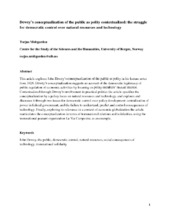| dc.contributor.author | Midtgarden, Torjus | |
| dc.date.accessioned | 2020-06-26T08:44:24Z | |
| dc.date.available | 2020-06-26T08:44:24Z | |
| dc.date.issued | 2019 | |
| dc.Published | Midtgarden T. Dewey’s Conceptualization of the Public as Polity Contextualized: The Struggle for Democratic Control over Natural Resources and Technology. Contemporary Pragmatism. 2019;16(1):104-131 | eng |
| dc.identifier.issn | 1572-3429 | |
| dc.identifier.issn | 1875-8185 | |
| dc.identifier.uri | https://hdl.handle.net/1956/23032 | |
| dc.description.abstract | This article explores John Dewey’s conceptualization of the public as polity in his lecture notes from 1928. Dewey’s conceptualization suggests an account of the democratic legitimacy of public regulation of economic activities by focusing on polity members’ mutual interest. Contextualized through Dewey’s involvement in practical politics the article specifies the conceptualization by a policy focus on natural resources and technology, and explores and discusses it through two issues for democratic control over policy development: centralization of power in federal government; and the failure to understand, predict and control consequences of technology. Finally, exploring its relevance in a context of economic globalization the article rearticulates the conceptualization in terms of transnational relations and solidarities, using the transnational peasant organization La Via Campesina as an example. | en_US |
| dc.language.iso | eng | eng |
| dc.publisher | Brill | eng |
| dc.title | Dewey’s Conceptualization of the Public as Polity Contextualized: The Struggle for Democratic Control over Natural Resources and Technology | eng |
| dc.type | Journal article | eng |
| dc.type | Peer reviewed | eng |
| dc.date.updated | 2020-01-21T07:53:57Z | |
| dc.description.version | acceptedVersion | |
| dc.rights.holder | Copyright 2019 Brill | eng |
| dc.identifier.doi | https://doi.org/10.1163/18758185-0161122 | |
| dc.identifier.cristin | 1681946 | |
| dc.source.journal | Contemporary Pragmatism | |
